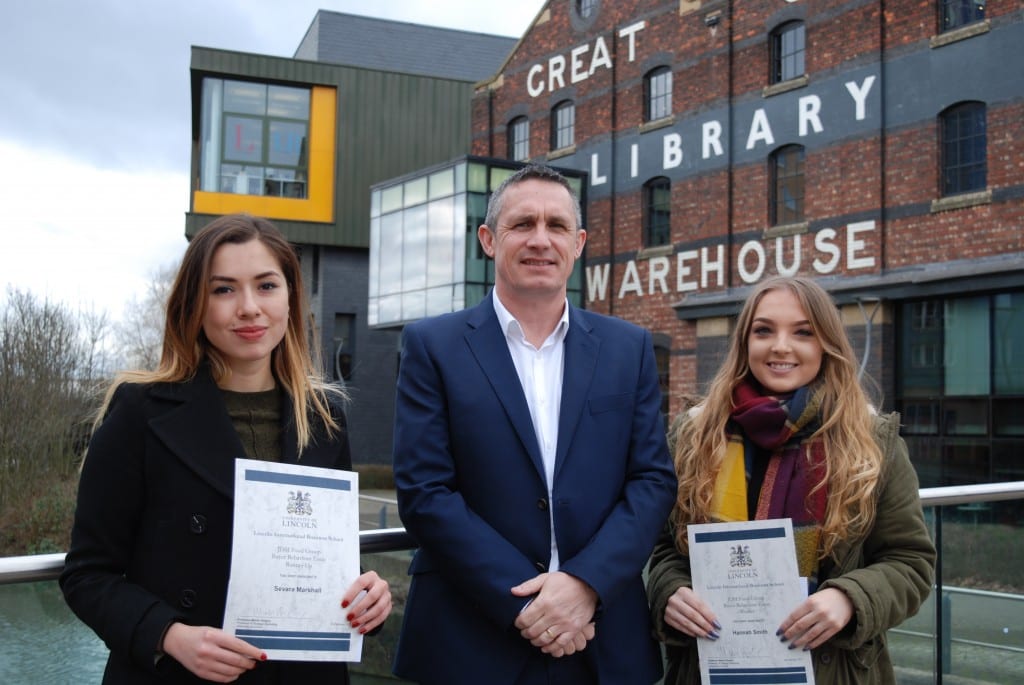Business and marketing students from the University of Lincoln have been testing their theories on consumer habits based on a real life case study of a major Lincolnshire food company.
Second year undergraduates from the University’s Lincoln International Business School took part in a prize essay competition exploring what the future buying behaviour of food consumers may be in an exercise supported by JDM Food Group.

The company, based in Bicker, near Boston in Lincolnshire, supplies UK retailers with products including garlic, ginger and butternut squash, and supplies food manufacturers and major High Street restaurants with dips, dressings, and marinades. JDM, which has been named one of the fastest growing food companies in the UK, also exports food products throughout Europe.
In an essay competition set by the company, students were asked to critically analyse major changes in consumer attitudes towards manufactured food products over the last 10 years, and whether consumer attitudes make a difference on buying habits and behaviour when it comes to making planned purchases or impulse purchases. They also evaluated how marketers might be influenced by the buying habits of the food sector.
Essays were part of assessed work, meaning their findings will contribute to their degrees. Four students judged to have submitted the strongest essays also received prizes from JDM Food Group in recognition of their work.
First prize winners Zoe Brumpton and Hannah Smith both received £100 in winnings from JDM. Runners-up Xiatong Zhou and Sevi Marshall also received £50 each.
Hannah, 20, from Newton Hall in Durham, is in the second year of a BA (Hons) Business and Marketing degree. She said: “JDM Food Group came in to give a lecture which provided us with statistics and lots of other information about the business, so we had lots to work with.
“On top of that, I did some further research of my own, looking at news articles and other information I could find about the business. I’m really pleased to have won the first prize, I wasn’t expecting a cash prize at all, so it’s very appreciated.”
Daren Bevan, Commercial Director of the Boston-based business evaluated the essays with academic staff from the University to determine the winners. He said: “The essays produced by the students captured the theory behind consumer behaviour and it was interesting to see how they used JDM as a live case to explain their theories. In doing so, they demonstrated a good understanding of the subject and it plays out in everyday situations.
“Those chosen as winners stood out because they were able to deliver a critical analysis of the changing patterns in consumer behaviour over recent years and then explain how the theory plays out in reality including the role of involvement in consumer decision making.
“One of our goals when working with the University is to present the food industry as a dynamic, challenging and multi-faceted career opportunity – recruitment is currently an issue across the whole of the food sector and something which has been identified by the GLLEP.”
The University and JDM Food Group now plan to build on their relationship by introducing internships for students.
Professor Martin Hingley, from the Lincoln International Business School, helped pick the four winning essays from around 150 students. They were assessed on both their academic and corporate business merits.
Professor Hingley said: “If there is one thing that students enjoy doing, and remember long after, it is applying their knowledge and skills to applied business problems.
“We were lucky to have Darren Bevan from JDM Foodgroup present to the group about the company’s cutting edge approach to innovation in fresh food. Through the prize essay competition, the students were inspired to creatively combine classroom theory and practice to produce refreshing and thought-provoking takes on the future of buyer behaviour for food.”